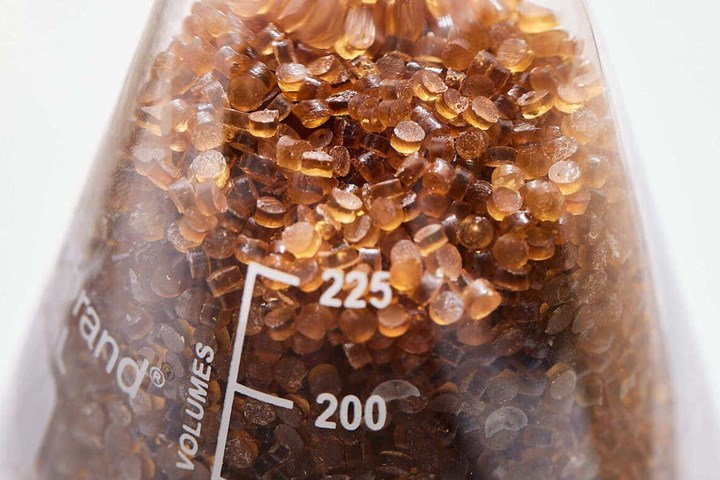Seaweed Packaging Resin Gets Federal Funding
Sway announced the receipt of an NSF grant to help continue developing its seaweed based resin.
Sway, a developer of bio-based materials for packaging, announced it will receive a Small Business Innovation and Research (SBIR) grant from the National Science Foundation (NSF). The $272,000 funding will be used to scale the next generation of the company’s biodegradable product, composed of mostly seaweed but melt-processable.

Sway's first generation Thermoplastic Seaweed Resin (TPSea), made entirely from seaweed and plants.
Photo Credit: Cody James Perhamus
According to Sway, the company’s Thermoplastic Seaweed Resin (TPSea) has the potential to transform seaweed into flexible packaging applications like polybags, retail bags, mailers, pouches and food packaging. The material will be designed to be used with existing plastic processing infrastructure.
“Our goal is to bring materials that replenish the planet into the mainstream,” says Julia Marsh, CEO and co-founder at Sway. “With backing from one of the most prestigious science organizations in the world, Sway is poised to evolve our home-compostable seaweed resins at a scale that will meaningfully support ocean farmers and transform the packaging materials we interact with daily.”
Sway will seek to expand the diversity of its feedstock portfolio, including unrefined seaweed, processing byproducts and invasive macroalgae.
“NSF accelerates the translation of emerging technologies into transformative new products and services,” says Erwin Gianchandani, assistant director for technology, innovation and partnerships at the NSF. “We take great pride in funding deep-technology startups and small businesses that will shape science and engineering results into meaningful solutions for today and tomorrow.”
Companies awarded a Phase I SBIR grant are eligible to apply for Phase II funding and additional supplements totaling up to $2 million.
Related Content
-
At NPE2024, Follow These Megatrends in Materials and Additives
Offerings range from recycled, biobased, biodegradable and monomaterial structures that enhance recyclability to additives that are more efficient, sustainable and safer to use.
-
Honda Now Exploring UBQ’s Biobased Material Made from Unsorted Household Waste
UBQ is aiming to expand its reach for more sustainable automotive parts as well as non-automotive applications.
-
Blend Amorphous PHA with PLA to Improve injection Molded Part Properties
Adding aPHA to PLA can boost a range of mechanical properties and expedite composting. Here are the details as well as processing guidelines for injection molding the blends.















